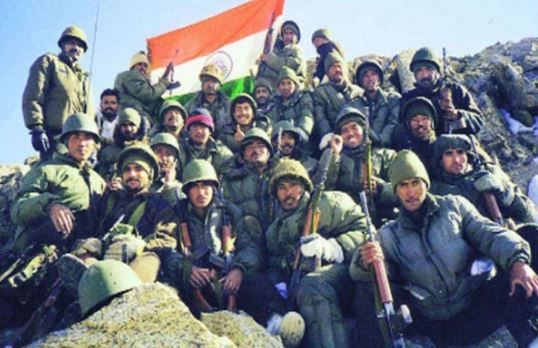Today, India marks 24 years of triumph over the Kargil War fought against Pakistan. On July 26, 1999, the gallant Indian soldiers recaptured several mountains, perched at high altitudes in the Himalayas, that were invaded by the Pakistani intruders in Kashmir. This day celebrates the victory and sacrifices of our soldiers.
The Kargil War Heroes are honoured on this day who bravely fought against the Pakistani army in 1999 in Dras, Kargil and Batalik sectors of western Ladakh.
India launched ‘Operation Vijay’ to clear the Kargil sector which was illegally occupied by the Pakistani soldiers and terrorists on the Indian side of the Line of Control (LoC).
The Kargil War in 1999 saw the country losing more than 500 soldiers. The Indian soldiers pushed back Pakistani troops, a bulk of them drawn from the neighbouring country’s Northern Light Infantry, from the captured peaks in Kargil.
Kargil War: History
After the 1971 war, ties between India and Pakistan were tense but the neighbouring countries had avoided military conflict until Kargil War. However, during the 1990s, escalating tension and conflict owing to separatist activities in Kashmir and other activities gave thrust to this impending conflict.
The two sides had even in February 1999 signed the Lahore Declaration in Lahore, promising a peaceful and bilateral solution to all issues including Kashmir.
However, in the winter of 1998–1999, Pakistani Armed Forces’ elements sent Pakistani troops and terrorists into the Indian territory across the line of control (LOC). This was code named as ‘Operation Badri’.
The motive was to weaken India’s military position in the region and cut the link between Kashmir and Ladakh. It was later discovered that Pakistan’s act was a planned attack on India.
Operation Safed Sagar
India responded to Pakistan with Operation Vijay. New Delhi mobilised more than 2,00,000 troops. It was on May 25 when the government decided to use air power during the Kargil War. It was code-named Operation Safed Sagar.
The Indian Air Force acted jointly with the Indian Army to flush out Pakistani infiltrators.
With Army and IAF already in operation, the Indian Navy too strategically mounted pressure on Pakistan through Operation Talwar. The Navy was aggressive patrolling off the Pakistani coasts during the war.
After a long battle, the Kargil War finally came to an end on July 26. Indian soldiers evicted Pakistani infiltrators from their occupied positions, thus marking it as Kargil Vijay Diwas.
Every year, on July 26, the Prime Minister pays his respects to the soldiers who were martyred in the war.
Soldiers such as Captain Manoj Kumar Pandey, Captain Vikram Batra, and Captain Keishing Clifford Nongrum, who sacrificed their lives to secure Kargil hill, were posthumously awarded the Param Vir Chakra and Mahavir Chakra.





